
(Matthew 16:13-23)
May these words of this Peter be like a rock,
not a stumbling block!
|
|
"Who do you say
that I am?" Jesus asked. Simon Peter answered, "You
are the Messiah, the Son of the living God." And Jesus
answered, "Blessed are you, Simon son of Jonah! ... You are
Peter (petros), and on this rock (petra)
I will build my church..." Jesus then began to speak of
the rough road ahead. And Peter took him aside and rebuked him... "Get
behind me, Satan!" Jesus replied. "You are a stumbling
block..." (Matthew 16:13-23) May these words of this Peter be like a rock, |
"Our Greatest Weapon"
Message preached February 2, 2003
Long Green Valley Church of the Brethren
Glen Arm, Maryland USA
based upon Luke
19:41-44
What is
our greatest weapon? Twelve years ago, the combined military forces of many
nations "liberated" Kuwait following an invasion by its neighbor,
Iraq. In the process, some of the most advanced weaponry yet developed was
unleashed, from brand-new stealth fighters and bombers, to cruise missiles, to
defensive patriot missile systems. "Smart" 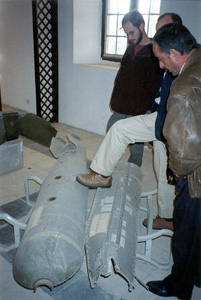 bombs,
some of which we "witnessed" via televised "delivery," were
employed in huge numbers. Armor-piercing, uranium-tipped
shells devastated the forces of Saddam Hussein, and continue to impact the
land and its people.
bombs,
some of which we "witnessed" via televised "delivery," were
employed in huge numbers. Armor-piercing, uranium-tipped
shells devastated the forces of Saddam Hussein, and continue to impact the
land and its people.
Iíve have been told that more bombs were dropped on the nation of Iraq during that relatively brief conflict than were used in all of World War II, which - if true - seems unbelievable. In response, oil rigs were set on fire by fleeing Iraqi forces, unleashing a terrible environmental disaster that is still being felt today. Fortunately, the feared use of biological and other weapons of mass destruction did not happen (we think?!?!), though there are still many veterans who suffer from a "gulf war syndrome" which remains somewhat of an enigma.
What is our greatest weapon? In the years since 1991, due to the effects of a corrupt Iraqi government, the destruction of that nationís infrastructure by the war, and UN sanctions intended to punish Hussein, the people of Iraq have greatly suffered. Iíve just mentioned multiple weapons, from a repressive regime, to military might, to economic boycott. Which "weapon" is greater? In this age of "terror" itself as a weapon, when passenger-filled jets have been transformed into weapons of mass destruction, when "Homeland Security" has become an everyday term, and we stand on the brink of another gulf war, what is our greatest weapon?
That is a question we have not raised enough. By asking it at the beginning of a month which may end with American G.I.ís on the ground in Iraq, I do not intend to be unpatriotic. Neither do I wish to jump on a particular political bandwagon. I see no simplistic answers to what is happening. I am no fan of a certain dictator. I have been told by a trusted friend who says he personally witnessed it, that Saddamís gassing of the Kurds is a fact. The answer to the question "what must be done?" is not to walk around saying, "Ďpeace, peaceí when there is no peace" (Jeremiah 6:14, 8:11). But that is not the question I am asking.
What is
our greatest weapon? ... Did you notice that something almost completely
disappeared in the aftermath of September 11th? Up to that point,
there was a question which had become somewhat of a fad in Christ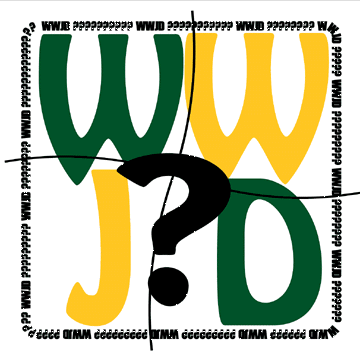 ian
circles. From a good friend I had even received a bracelet with four letters on
it. If I could find it now, Iíd be wearing it this morning as a reminder, but
even for me this question has somehow become lost. What were those four letters
that framed a popular question pre-9/11? ... WWJD - What would Jesus do? Have
you noticed that nobody has been asking that question lately?
ian
circles. From a good friend I had even received a bracelet with four letters on
it. If I could find it now, Iíd be wearing it this morning as a reminder, but
even for me this question has somehow become lost. What were those four letters
that framed a popular question pre-9/11? ... WWJD - What would Jesus do? Have
you noticed that nobody has been asking that question lately?
Why? Perhaps, because, as a fad it became too simplistic. In everyday, toss-around life it had already lost some of its meaning. However, now, when things seem to matter a whole lot more than they did before September 11th, when the stakes seem a lot higher, when the world is at the brink - not just of war, but of other shattering events - this question becomes prophetic. What would Jesus do? Indeed! Maybe we donít really want to know what Jesus would do. After all, we know what the forces behind all the weapons of his day did to him, from super-power Rome, to terrorist zealots, to religious authorities. What did Jesus do then? What would Jesus do today? If we ask the question, then we might need to pay attention to the answer. Right?
But thatís not the question I ask this morning. Perhaps, though, itís one you might wish to resurrect for a time such as this. Such prophetic questions force us to examine ourselves. That, by the way, was and is the primary role of a prophet, in the biblical sense. Contrary to popular opinion, prophecy is not about predicting the future. Mind you, God is the Lord of time. The outcome of events in this world is no secret to the Master of the Universe. Prophecy does involve the future primarily because it involves God, who is not limited to the past or the present. However, a prophet is one who speaks for God - and so often this voice is not so much an exclamation point as it is a question mark.
What is
our greatest weapon? That should be to Godís people a disturbing question, one
which - before it ever brings us comfort (which it does, believe me) - shakes us
up, knocks down our false assumptions, pulls the rug from under how we too
easily make sense of our world. Nobody likes to hear the prophetís question,
not even the prophet. Look through the 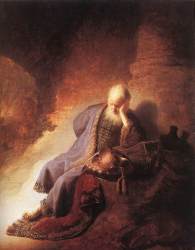 Bible
and you will see that Godís prophets were not the most beloved members of
society. Jeremiah was viewed much like the village idiot, but his nagging
questions would not go away. When Jesus physically walked this earth, he was
more than a prophet. Still, he spoke the often questioning, disturbing Word of
God, and he was no more accepted than the prophets who came before him.
Bible
and you will see that Godís prophets were not the most beloved members of
society. Jeremiah was viewed much like the village idiot, but his nagging
questions would not go away. When Jesus physically walked this earth, he was
more than a prophet. Still, he spoke the often questioning, disturbing Word of
God, and he was no more accepted than the prophets who came before him.
I find my blood-pressure has risen, and Iíve become so serious that many of you may close the door to what I have to say. I wish I had a good joke to tell just now to relieve the tension of this moment, but thatís not been my gift. The door Iíd like to keep open, though, is the one that invites you into the role of "prophet." I am not the only prophet in this room. If anything, I am but a fool with a question to open us all to the wisdom of God. I do not intend to answer this question in a definitive way. I share my ponderings, but my intent is to encourage you to answer the question as God directs you, knowing that - in the process - God will shake you up even as your faith is strengthened.
What is our greatest weapon? Well, you know that I couldnít be a Brethren minister if I were to claim any of the weapons I listed at the beginning of this message as our "greatest weapon." I donít believe any Christian conscientiously could, even those who make use of them. By the way, I want to thank those of you who may disagree with the peace witness of your church, but who chose not to stand in the way of allowing this witness to be made. Being "of one mind" does not mean we agree on everything. Our peace witness, however, is one of the gifts our denomination brings to the larger church. It needs to be shared.
Again, though, what is our greatest weapon? If itís none of the weapons I mentioned earlier, what is it? ... Last Fall I shared an idea with the Witness commission about putting up a banner out front, facing the road - on it printed something prophetic, but also positive. This sermon grew out of that idea, because what I had in mind was something Russ Keat had recently shared with me. Russ is no pacifist, but this man who witnessed first-hand the destruction of the World Trade Center when he did subterranean search and rescue immediately after 9/11 said, "Compassion is our greatest weapon." Iím not sure how positive the folks on the Witness commission were to my idea. If we were to put such a banner up as the winds of war begin to blow in earnest, would that be what it should say? "Compassion is our greatest weapon"?
Maybe it
should read along the lines of something Wilbur Gosnell said at the last menís
breakfast. "Every night I pray for the President." I didnít hear
that as a partisan comment. I heard it as a call to use a weapon we too often
only see as a last 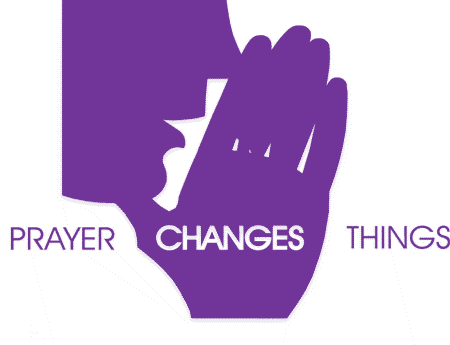 resort.
Perhaps we should have a banner out front reminding our community (and
ourselves!) that "Prayer is our greatest weapon." If so, our prayer
needs to extend beyond the Oval office. Many of the alternatives to war Iíve
heard voiced recently involve something happening in Baghdad - more
transparency, acknowledging and removing weapons of mass destruction, even the
stepping down of a dictator. Certainly prayer should go before any weapon of
mass destruction on our part.
resort.
Perhaps we should have a banner out front reminding our community (and
ourselves!) that "Prayer is our greatest weapon." If so, our prayer
needs to extend beyond the Oval office. Many of the alternatives to war Iíve
heard voiced recently involve something happening in Baghdad - more
transparency, acknowledging and removing weapons of mass destruction, even the
stepping down of a dictator. Certainly prayer should go before any weapon of
mass destruction on our part.
The unsettling thing about prayer, though, is what God does in those who pray, not just in what they pray for. It is, after all, an awesome thing to come before the Living God. In the process of praying, God may ask us those questions which can be so unsettling. Like, "what is your greatest weapon?" "Upon what, or whom are you depending?" Prayer opens the door to Godís questions, even as it clears the way for Godís providence. "When you say, ĎGod bless America,í is that a statement of fact or a request of me? Is what you are doing in this world blessing me?" ... Prophetic questions.
Again, I donít wish to answer the question I am asking you. To our youth, I want to repeat "what is our greatest weapon?" Perhaps that question will lead you to take some prophetic steps of faith. As your church, we speak of conscientious objection, choosing alternatives to conflict. As you are becoming adults you need to make some tough decisions. We have been blessed in this country with a time when a military draft has not forced some to act against their conscience. But that never is a guarantee, even in this land where we have the freedom to dissent. Though I donít see much support for it, there is a move right now to reinstate the draft. Events may change, though, especially if this war comes to pass and it doesnít pass quickly. Now is the time to lay the foundation if you are led to follow your churchís teaching. Get down on paper what you believe and register it with the church, so that a future draft board may see that your convictions arenít just a passing fad.
"What
is our greatest weapon?" Thatís not just a question for youth. Itís for
us all. Jesus spoke a similar question as he stood before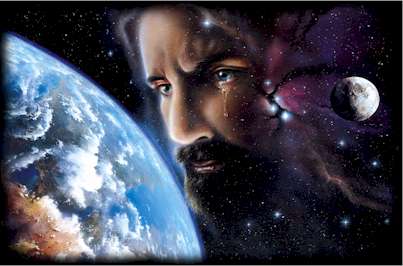 Jerusalem 2,000 years ago. We need to remember, my friends, that even if Jesus
is not considered to be the Savior, or the Son of God, by our Muslim or Jewish
neighbors in this world, he is still considered to be a prophet by them. His
prophetic question - and yes, it is a question, not a statement, for if we only
hear it as a statement targeting someone else we have failed to hear God speak
the Word that shakes us up and turns our world upside down (or is it rightside
up?). Jesusí prophetic question was this - "If only you knew the
things that make for peace, but now are hid from your eyes...."
Scripture says he wept as he spoke those words. Maybe our banner should read,
"his tears are our greatest weapon."
Jerusalem 2,000 years ago. We need to remember, my friends, that even if Jesus
is not considered to be the Savior, or the Son of God, by our Muslim or Jewish
neighbors in this world, he is still considered to be a prophet by them. His
prophetic question - and yes, it is a question, not a statement, for if we only
hear it as a statement targeting someone else we have failed to hear God speak
the Word that shakes us up and turns our world upside down (or is it rightside
up?). Jesusí prophetic question was this - "If only you knew the
things that make for peace, but now are hid from your eyes...."
Scripture says he wept as he spoke those words. Maybe our banner should read,
"his tears are our greatest weapon."
No, let the question remain open. How will you respond? What is our greatest weapon?
| What can I do? What can we do? |
For commentaries consulted, see Luke. |
©2003 Peter L. Haynes